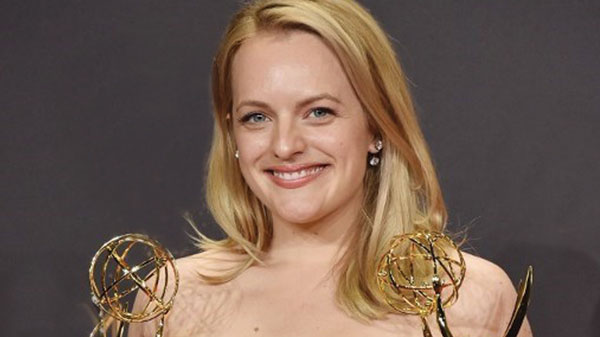It’s the TV series that, whether by luck or by design, has seemed most zeitgeisty in the #MeToo world, a post-apocalyptic, satirical, shot-from-thehip, righteous screech of anger at never-shouldhave- been male domination. Or, as the TV guides preferred to bill it, The Handmaid’s Tale. Based on the 1985 dystopian novel of the same name by Margaret Atwood, the multi-award winning Canadian writer, the programme – already in its third season – caught the imagination of a generation, embodying and taking to the extreme the eternal battle of the sexes, leaving women angry and emboldened, and any male with a tad of self-awareness shamefaced and contrite.
Although the timeliness of its debut – its first episode was broadcast shortly before the downfall of Hollywood producer Harvey Weinstein sent the #MeToo movement global – undoubtedly played a huge role in its success, its enduring popularity is also down to the stunning performance of Elisabeth Moss, the Los Angeles-born actress who brought to life the pivotal role of Offred, the eponymous handmaid whose tale is told.

Born in July 1982 to two musicians, it’s safe to say a love of performing has always flowed through her veins. Although, at the age o f just eight, she moved New York City to train as a ballerina, her acting abilities soon eclipsed her fancy footwork and saw the young actress cast in Lucky Chances, a 1990 NBC miniseries. Her big break, though, didn’t come for another nine years when she was ultimately cast as Zoey Bartlet, the fictional daughter of Martin Sheen’s equally-fictional US president in the critically-acclaimed The West Wing. It was a character she was to play for the next seven years, while also finding time for guest appearances in a number of other high-profile TV shows of the time, most notably Grey’s Anatomy and Medium.

Then, in 2007, she was cast in a role that would ensure she would be far more than a one-hit wonder. This was the role of Peggy Olson, a frumpy and overly eager secretary in Mad Men – a sustained riff on the glories and grotesqueries of the US advertising industry in the ’60s – which arguably allowed her a wider pallet than her West Wing days. As her role evolved, Moss went on to be recognised with both Emmy and Golden Globe nominations.
Despite this acclaim and Mad Men’s demanding schedule, she still found time for a number of other high-profile roles, most notably as Robin Griffin in Top of the Lake, a gritty Sundance / BBC drama – a role that took her some 12,000km away from Tinseltown to the far-distant city of Queenstown in New Zealand. Playing a detective specialising in sexual assault cases assigned to investigate the disappearance of a pregnant 12-year old girl, it was the performance that saw Moss win her first Golden Globe for ‘Best Performance by an Actress in a Limited Series or a Motion Picture Made for Television’.

While she couldn’t put a foot wrong on stage or screen, away from the greasepaint and critical adoration, things were a little less steady. Her marriage to actor and former star of Saturday Night Live, Fred Armisen, lasted just eight months. It was a disaster somewhat mitigated by Armisen publicly confessing the couple’s subsequent divorce had been largely down to him. Not one to duck to such a PR gift, Moss then went on record saying: “One of the greatest things I heard someone say about Fred is: ‘He’s so great at doing impersonations’. The greatest impersonation he does, though, is that of being a normal person”.
Moss herself, however, has not been immune to accusations of not being normal, with many such jibes centring around her lifelong commitment to Scientology, a cult-like religion that has had frequent run-ins with various US authorities over many, many years. Indeed, perhaps because her career has been quite so scandal-free, it’s the Scientology issue that the more dogged / less imaginative journos have returned to time and again, with many suggesting that her allegedly misanthropic religion is wholly at odds with her feminist credentials.
Eventually driven to try and end these seemingly interminable intimations, Moss ultimately took to her Instagram account to state: “Religious freedom and tolerance and understanding the truth and equal rights for every race, religion and creed are extremely important to me” – a declaration that, almost certainly, did absolutely nothing to stem such accusations.

A more robust defence of her feminist allegiances, of course, has come courtesy of her role in The Handmaid’s Tale, arguably her most high-profile and heartfelt performance to date. For three seasons now, she has wowed viewers as the series’ heroine, a woman constrained by the dictates of a society more male dominated than even ’60s Madison Avenue. With reviews of the series having remained more or less positive throughout, Moss proved a popular winner of the 2017 Emmy for Outstanding Lead Actress in a Drama Series. The series also saw her win her second Golden Globe, this time as Best Actress in a Television Series Drama.
The Kitchen will see Elisabeth Moss share top billing with two other actresses who have graduated from the small to the big screen – Melissa McCarthy and Tiffany Hadish. Whether her own role – as an Irish mobster’s wife who, herself, ultimately embraces the dark side – marks her formal ascension to movie stardom or proves just another intriguing digression in her TV-centric career will rather depend on just how much kerching she brings to the box office.
Text: Bailey Atkinson
Photo: AFP



